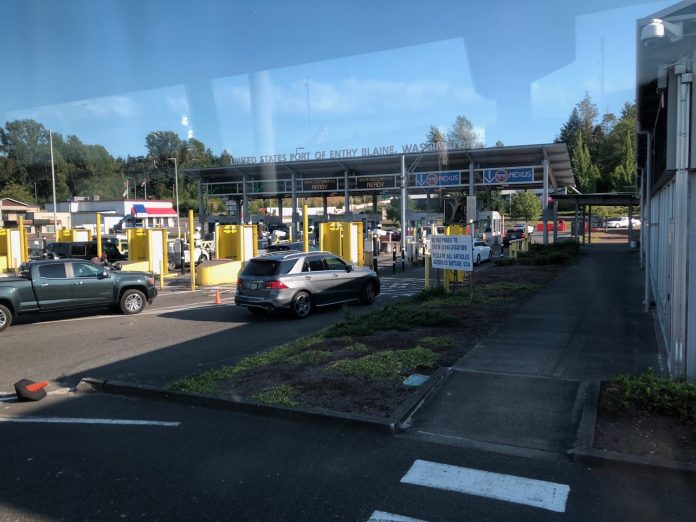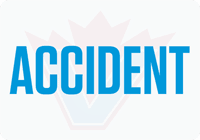THE Canada Border Services Agency (CBSA) reminds all travellers crossing the border this upcoming Victoria Day long weekend of what to expect at the border during the busy summer months, whether returning home to Canada or visiting.
This summer, travellers are returning to a border that is managed differently, with evolving COVID-19 requirements, which can mean delays during peak periods. The CBSA says it is working to mitigate long border wait times, but there are also things that travellers can do to make the process easier for themselves and other travellers.
Travellers can help reduce wait times at the border by coming prepared and by completing their mandatory ArriveCAN submission within 72 hours before arriving at the border.
The CBSA says it invests significant effort annually to plan and prepare for peak periods, such as the summer months. It works with bridge and tunnel operators, airport authorities and travel industry groups to plan and review service requirements, enhancement opportunities and required resources so that they can deliver together the best service to all travellers.
The CBSA says it has also established modern processes to improve the traveller experience and manage volumes, like the International-to-Domestic and the International-to-International programs that significantly decrease connection times, as well as the Primary Inspection Kiosks, and the advance CBSA declaration option.
Key tips for all travellers:
* Ensure you are eligible to enter Canada. Foreign nationals must meet the entry requirements under the Immigration and Refugee Protection Act and provide appropriate travel and immigration documentation. The final determination on entry is made by a border services officer at the port of entry.
* Understand the rules around COVID-19. There are still border measures in place for COVID-19. They vary depending on who is travelling – foreign nationals, returning residents or Canadian citizens. Answer a few questions to find out which requirements apply to you and if you can enter Canada.
* Use ArriveCAN. All travellers, regardless of vaccination status, are required to submit their information in ArriveCAN (free as a mobile app or by website), up to 72 hours before entering the Canada. ArriveCAN collects contact, health and travel information to protect the health and safety of travellers and expedite processing at the border. It is the fastest, easiest and most secure way for travellers to show they meet public health requirements.
– Travellers must ensure they have the most up-to-date version of the ArriveCAN app (consult the Google Play Store or the App Store for iPhone.)
– Travellers should print or take a screenshot of their ArriveCAN receipt and bring it with them when they travel.
– Travellers without a smartphone or without mobile data can submit their information by signing in online through a computing device. If travellers are unable to enter their information themselves, they can have a friend or family member enter the information for them.
* Have all your documents ready. Travellers should have the following ready to present to the border services officer: their ArriveCAN receipt, passport or travel documents, proof of vaccination, and identification for all persons in the vehicle.
* Plan ahead and check border wait times. Travellers crossing the border by land are encouraged to plan to cross during non-peak hours such as early morning. The Monday of holiday long weekends tend to be the busiest, with longer border wait times.
* Entering Canada by water. Unless exempt, all travellers entering Canada by water must report their arrival to the CBSA without delay. All travellers, including those with a right of entry (Canadian citizens, permanent residents and persons registered under the Indian Act), must submit their mandatory information in ArriveCAN before, or when, entering Canada at a marine port of entry.
* Be prepared to declare. Travellers returning to Canada should be ready to declare all goods purchased and/or received while outside the country. It is recommended that gifts not be wrapped as we may need to examine them more in-depth. Have your receipts readily available from purchases made outside of Canada.
* Know your exemption limits. Returning residents planning to make purchases or pick up online purchases across the border should be aware of their exemption limits. Be sure to check the CBSA duty and taxes estimator to calculate taxes on goods purchased in the United States and to help make informed decisions when shopping abroad.
– Residents can bring back tax and duty free goods valued at CAN$200 after being away for 24 hours, and goods valued at CAN$800 after 48 hours. There are no personal exemptions for same-day cross-border shopping trips, so be prepared to pay tax on those purchases and possibly duty.
– Declare any foods, plants, or animals, such as raw poultry products and by-products that are not fully cooked, to the border services officer. There are currently restrictions on imports of live birds, bird products and by-products from states affected by Highly Pathogenic Avian Influenza in the United States. Also declare all wood and wood products (including firewood and wooden souvenirs). Be sure to check the Automated Import Reference System to help determine all specific import requirements.
* Declare all money or currency of CAN$10,000 or more. It is not illegal to bring such amounts into Canada, but it must be declared on arrival.
* Cannabis. Don’t bring it in. Don’t take it out. Transporting cannabis across the border in any form, including any oils containing tetrahydrocannabinol (THC) or cannabidiol (CBD), without a permit or exemption authorized by Health Canada remains a serious criminal offence subject to arrest and prosecution, despite the legalization of cannabis in Canada.
* Advance Declaration. Air travellers landing in Toronto (YYZ) or Vancouver (YVR) may use ArriveCAN (web version) to complete their customs and immigrations declaration in advance of their arrival in Canada. This feature will be expanded to other airports in the future.
* Know the contents of your vehicle. Travellers can consult the CBSA’s website for information on firearms and other restricted and prohibited goods.
* Use the latest technology. Upon arrival at selected major airports in Canada, travellers can use a primary inspection kiosk to verify their travel documents, confirm their identity and complete an on-screen declaration.
* Children. When travelling with children, it is recommended that the accompanying adult have a consent letter authorizing them to travel with the child. Border services officers are always watching for missing children, and in the absence of the letter, officers may ask additional questions, to help them identify the relationship between the child and the accompanying adult.
For more information, visit the CBSA website or call 1-800-461-9999.
Associated Links
· The Canada Border Services Agency reminds boaters of entry and reporting requirements – Canada.ca
· Before You Travel: for fully vaccinated foreign nationals
· COVID-19: Travel, testing and borders












